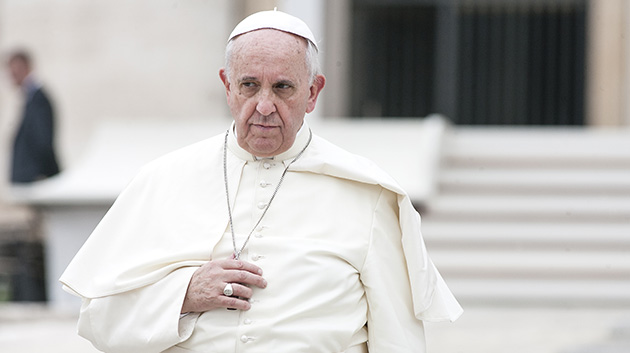Vatican and China Sign Provisional Agreement Over Bishops
Home of the Catholic Church Compromises to Nation of Religious Oppression
giulio napolitano / Shutterstock.com
Key points in this article:
- The Vatican compromised with China, a religiously intolerant nation, over appointment of bishops.
- The deal sparks a fear of religion becoming more “Sinicized,” leading to the destruction of religious freedom.
- There’s a possibility the Vatican and Taiwan will break off ties with each other.
The Vatican, a leader of the Roman Catholic Church, and the Chinese government recently signed a provisional agreement regarding an on-going conflict with the appointment of bishops.
The Chinese government is currently receiving national backlash as the situation with China’s domestic political oppression is being unraveled. The agreement symbolizes that the Vatican, home of the Catholic Church, is leaning towards a religiously intolerant nation. What can we expect proceeding the agreement?
The Vatican and China have long vied for power over the appointment of bishops.
The Vatican asserts that the Pope has the power to appoint all bishops. On the other hand, China claims that religious organizations and affairs aren’t under the domination of foreign forces. They don’t recognize the Roman Catholic Pope’s right to appoint bishops. Thus, the accepted Chinese Christian organization has independently appointed bishops in the past.
Previously, the seven bishops appointed by the Chinese Communist Party had been excommunicated. Under the new deal, however, Pope Francis must recognize those seven bishops appointed by the Chinese government.
China and the Vatican couldn’t establish diplomatic relations due to this issue over the appointment of bishops. Now that both countries have leaned toward each other, it is reported that both countries will move toward restoring their diplomatic ties.
The Fear of Increasing ‘Sinicization’ of Religion
Why is the Vatican showing support for China in the first place?
From the Vatican’s perspective, China is the “last frontier” that holds one of the largest global Christian forces. It is said that the population of unofficial Christians in China amounts to over 100 million people. Pope Francis most likely believes that an official tie with China will secure the freedom of Catholics and Christians within the Chinese boundaries.
Despite his motive, the Vatican’s compromise with China elicits fear on religion’s “sinicization,” or the process of coming under the influence of the Chinese culture.
The bishop is responsible for the parish that is provided for missionary work and to manage the disciples. For this reason, the Pope must enforce his arbitrary power to appoint bishops.
According to Reuters, there’s a possibility that Chinese authorities will select their local Christian church and candidates, while the Vatican gets the final say to appoint bishops. Substantially, only those selected by the Chinese government can become bishops.
As part of the religious “sinicization,” many Christian churches in China are being shut down. In addition, movements to combine the Christian doctrine with socialism and communism are initializing. China will try to appoint a person of strong loyalty to the government as bishop in order to proceed with these policies.
The Vatican May Cut Ties with Taiwan
The China-Vatican diplomatic deal also affects the cross-strait relations between China and Taiwan.
China listed the “One-China policy” to pressure Central and South American countries that have formed diplomatic ties with Taiwan to cut relations with them. China seeks to internationally isolate Taiwan.
The Vatican is the only European country that maintains their diplomatic ties with Taiwan. As a global head of Roman Catholicism, the Vatican holds enormous global impact. Many of the countries that have diplomatic relations with Taiwan are Christian—if the Vatican officially cuts ties with Taiwan, those Christian countries may follow the Vatican’s decision.
China (NOTE: DO YOU MEAN TAIWAN HERE?) fails to accept the “One-China policy” and takes foreign policy measures to globally isolate the Ing-wen administration’s idea of an independent Taiwan. It is effective for China to pressure the Vatican to cut their ties with Taiwan.
Criticism Amongst Catholic Churches
“The issue of appointive power over bishops signifies that the Vatican has given up their authority to select bishops and has instead given it to the Communist Party,” said Cardinal Joseph Zen Ze-kiun, Bishop Emeritus of Hong Kong, who has long been wary of the Vatican’s pro-Chinese attitude. “I have done missionary work on Mainland China for seven years, so I know how the government-recognized churches are censored. The priest conferences are all for show and they simply receive orders from the Communist Party.”
This statement was published in the June 2018 edition of The Liberty Magazine.
“China is only thinking about unification under a church that is recognized by the Chinese government. To accept this is equivalent to voluntarily walking inside a bird cage. Even the disciples who have been attending underground churches in pursuit of true faith must submit to the Chinese Communist Party. It is truly dreadful,” Cardinal Zen Ze-kiun said.
If China and the Vatican officially form diplomatic ties stemming from the provisional agreement, the Chinese government will have an incentive to apply their “morality” on a global scale. This equates to a “death of religious freedom” for Christians residing in China. The Vatican has a duty to protect the world’s freedom of religion and pursue a rightful decision.



















